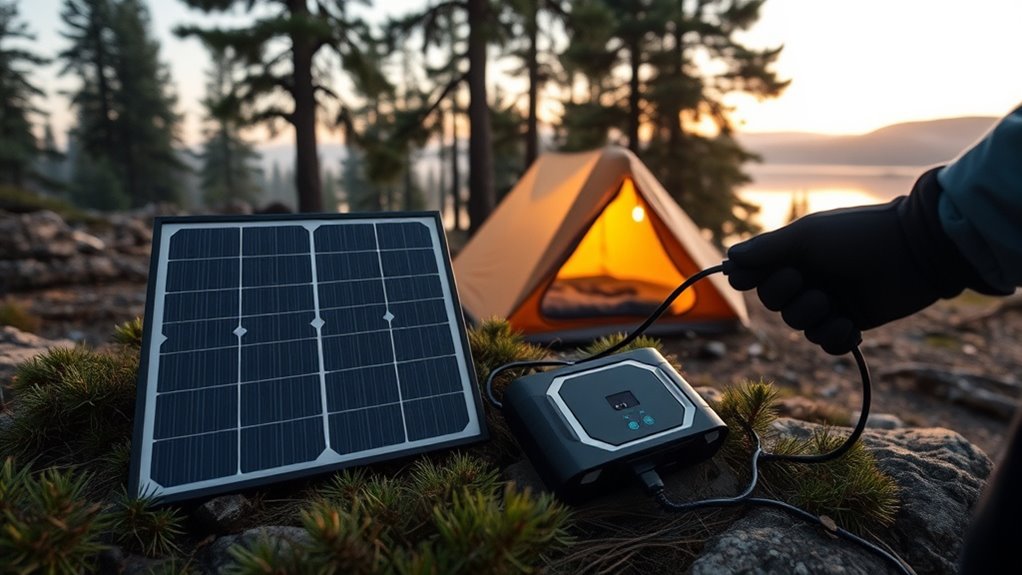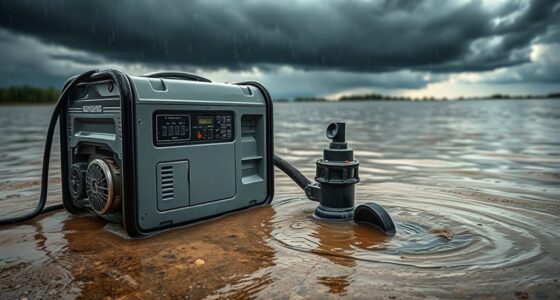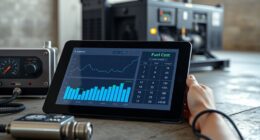When planning camping power, it’s easy to fall for myths like bigger solar panels or batteries always mean better energy. In reality, matching your gear to your actual needs is key—smaller, efficient panels and batteries can work just fine if you prioritize essential devices. Understanding how solar and batteries function can prevent overspending and ensure reliable power. Want to get the facts straight and avoid common pitfalls? Keep exploring to discover what truly matters.
Key Takeaways
- Matching solar panel size and battery capacity to actual energy needs prevents overspending and inefficiency.
- Larger solar panels or batteries don’t always mean better; efficiency and proper sizing are more important.
- Prioritize essential devices and understand their power consumption to optimize your setup.
- Choose high-quality, portable solar chargers and batteries suited for outdoor conditions.
- Proper planning and knowledge of solar and battery fundamentals ensure reliable, cost-effective camping power.
Debunking Common Camping Power Myths
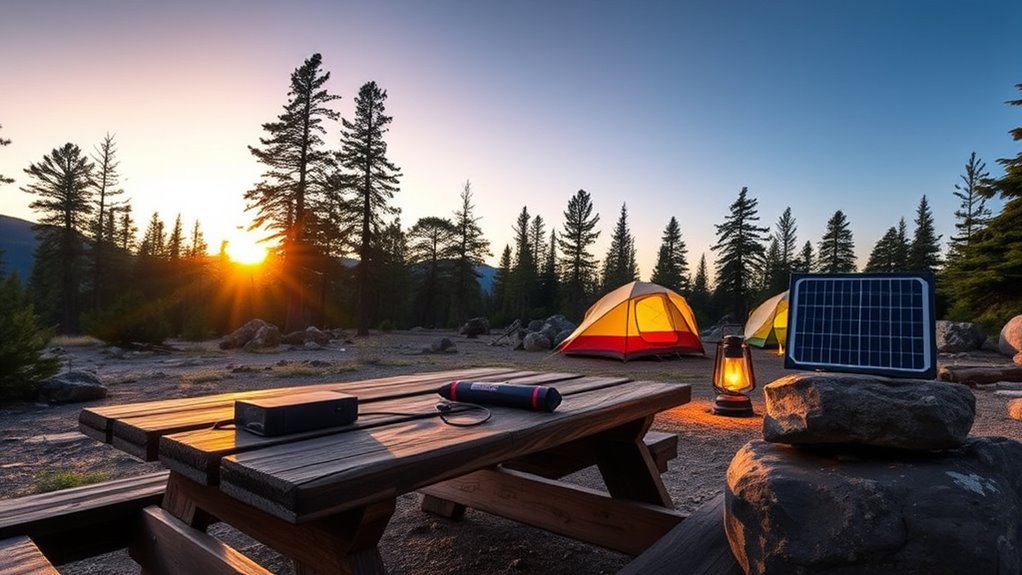
Many camping myths about power can lead you to make inefficient or unsafe choices. One common misconception is that bigger solar panels always mean more energy, but they must match your actual power needs and available sunlight. Similarly, some believe larger battery capacity guarantees enough power for all trips, but excess capacity can be unnecessary and costly if your energy demands are low. Relying solely on these myths can cause you to overspend or underestimate your power needs. Proper planning involves understanding how solar panels convert sunlight into energy and how battery capacity stores that energy efficiently. Instead of assuming bigger is better, focus on matching your solar setup and battery capacity to your specific camping habits, ensuring safe, reliable power without waste or risk. Additionally, understanding the TikTok platform can help you discover new trends and tips for optimizing your camping gear and power solutions through popular content and tutorials.
Essential Power Needs for Outdoor Adventures
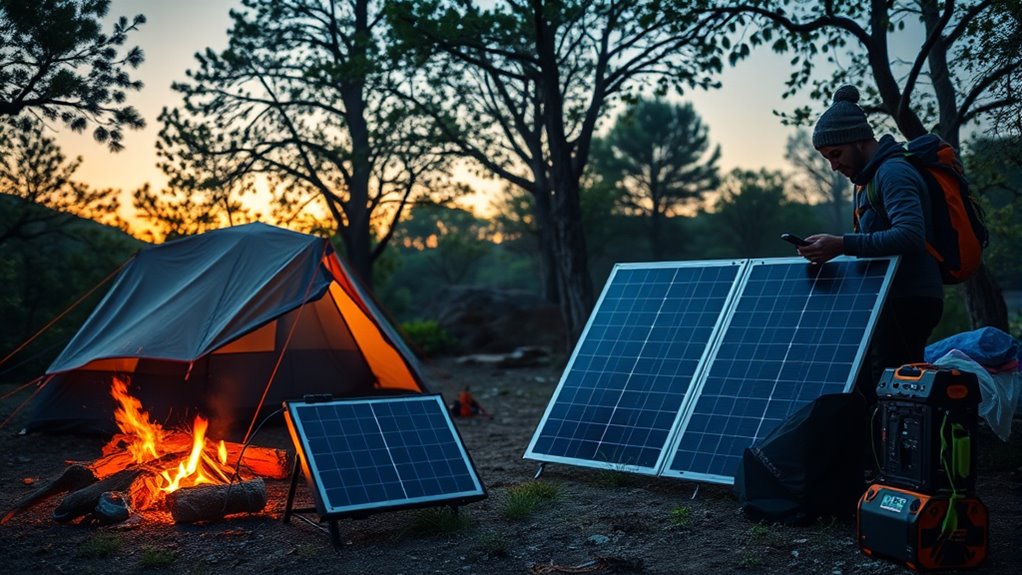
Understanding your actual power needs is key to outdoor adventures. Start by evaluating what devices you’ll rely on, like smartphones, GPS units, or portable lights. Knowing your battery capacity helps determine how long your gear can run without recharging. Solar charging becomes crucial if you’ll be off-grid for extended periods; a reliable solar panel can keep your batteries topped up during daylight. Prioritize devices that are essential to avoid overloading your power system. Keep in mind that larger battery capacities offer more flexibility, but they also add weight and bulk. Balance your power needs with your packing space and trip duration. Additionally, understanding whole-house system comparisons can help you choose the most efficient power sources and storage options for your outdoor setup. By focusing on these essentials, you’ll ensure your outdoor experience remains energized and trouble-free.
Choosing the Right Gear for Reliable Camping Energy
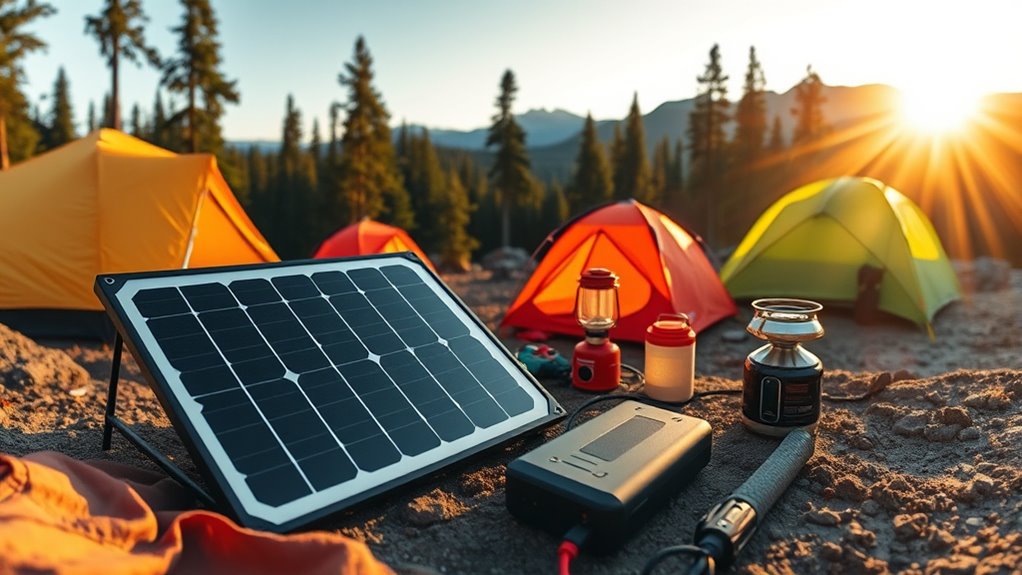
Selecting the right gear is essential to guarantee your camping energy stays reliable throughout your trip. Focus on solar panel efficiency to maximize energy collection, especially in variable sunlight conditions. High-efficiency panels convert more sunlight into usable power, reducing the need for larger, bulkier setups. Equally important is battery capacity optimization; choose batteries that match your energy demands without excess. Properly sized batteries ensure you have enough stored energy without unnecessary weight or cost. Invest in durable, portable solar chargers and reliable batteries that suit your camping environment. Additionally, consider compact design features that enhance portability and ease of setup. By balancing solar panel efficiency with battery capacity optimization, you create a resilient power system that keeps your devices running smoothly, no matter where your adventure takes you.
Frequently Asked Questions
How Can I Extend My Camping Power Supply Overnight?
Think of your camping battery as a reservoir, slowly draining as you use power. To extend your supply overnight, manage your power wisely—turn off unnecessary devices and switch to energy-efficient settings. Using a larger battery capacity or adding a portable solar panel can also aid in refilling your reservoir during the night. Good power management ensures your campsite stays energized, turning darkness into a well-lit adventure rather than a power shortage.
What Are the Best Eco-Friendly Power Options for Camping?
You should consider eco-friendly power options like solar charging and wind energy. Solar panels are lightweight, easy to set up, and harness sunlight to keep your devices powered. If you’re in an area with wind, portable wind turbines can generate electricity efficiently. Combining these methods guarantees a sustainable energy source during your camping trip, reducing environmental impact while keeping your essentials charged and ready.
How Do Weather Conditions Affect Portable Power Reliability?
Imagine it’s like a scene from your favorite sci-fi film; weather impact can cause significant power fluctuation in your portable devices. Rain, snow, or strong winds can reduce battery efficiency and disrupt solar charging, making your power supply less reliable. Extreme temperatures can also drain batteries faster. To stay prepared, always check weather forecasts and have backup options, like portable generators or extra batteries, ensuring your camping trip stays powered regardless of the weather.
Can Solar Panels Fully Power All Camping Devices?
Solar panels can fully power your camping devices if you consider solar efficiency and battery capacity. High-efficiency panels maximize energy collection, while sufficient battery capacity stores enough power for cloudy days or extended use. However, it’s unlikely you’ll rely solely on solar, especially during overcast weather or at night. To guarantee reliable power, combine solar with backup options like portable batteries or generators.
What Safety Precautions Are Needed for Camping Power Systems?
Prioritize protecting your power setup with proper precautions. Always handle batteries carefully to prevent damage and avoid fire hazards. Keep batteries in well-ventilated, cool spaces, and never overload circuits. Regularly inspect connections for corrosion or wear, and use appropriate fuses to prevent sparks. Practice proper storage, and stay vigilant against potential fire risks. By balancing battery safety with cautious connections, you keep your camping power safe, sound, and stress-free.
Conclusion
Now that you’ve uncovered the truths behind camping power myths and learned what truly matters, you’re better equipped for your next adventure. But the real question is, are you ready to choose the perfect gear that guarantees energy when you need it most? The right setup can make or break your trip. Stay tuned—your ultimate camping power solution might be closer than you think, and the surprises ahead could change how you camp forever.
